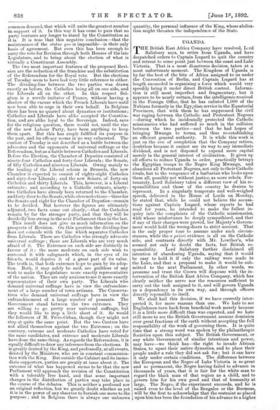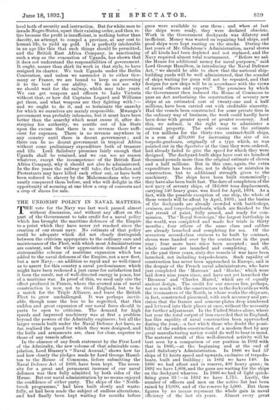UGANDA. T HE British East Africa Company have resolved, Lord Salisbury
says, to retire from 'Uganda, and have despatched orders to Captain Lugard to quit the country and retreat to some point just between the coast and Lake Victoria. That is a most disastrous decision, taken at a most unfortunate moment. The Kingdom of Uganda is by far the best of the bits of Africa assigned to us under the Convention of Berlin, and Captain Lugard has at length succeeded in organising a force which would very speedily bring it under direct British control. Informa- tion is still most imperfect and fragmentary, but it appears to be nearly certain, from the intelligence received in the Foreign Office, that he has enlisted 1,000 of the Nubians formerly in the Egyptian service in the Equatorial Provinces, that with them he has suppressed the civil war raging between the Catholic and Protestant Negroes —during which he incidentally protected the Catholic missionaries who had suffered so much in the collision between the two parties—and that he had hopes of bringing Mwanga to terms, and thus re-establishing an efficient general authority. It is while this work is just on the eve of completion that the Company retires, doubtless because it cannot see its way to any immediate dividend, and is not disposed to expend more capital merely in the general interest of civilisation. It gives up all efforts to reduce Uganda to order, practically betrays the Egyptian troops to the Negro King Mwanga, and abandons all Protestant Negroes, not only to their Catholic rivals, but to the vengeance of a barbarian who looks upon them all, possibly not without justice, as mere rebels. For- tunately, Lord Salisbury takes a different view of his re- sponsibilities and those of the country he desires to represent. In a singularly temperate and well-weighed speech, delivered in the House of Lords on Monday, he stated that, while he could not believe the accusa- tions against Captain Lugard, whose reports he had. read for years, he intended to make the fullest in- quiry into the complaints of the Catholic missionaries, with whose misfortunes he deeply sympathised, and that if any of their charges were proved, her Majesty's Govern- ment would hold the wrong-doers to strict account. That is the only proper tone to assume under such circum- stances, while the a priori evidence is all on the Catholic side, and contrasts directly with Mr. Lowther's, who seemed not only to doubt the facts, but British re- sponsibility. Lord Salisbury further disclaimed all intention of abandoning Uganda, saying that it would be easy to hold it if only the railway were made to the Lake, and that a proposal to make it would be sub- mitted to the next Parliament. In other words, we presume and trust the Crown will dispense with the in- tervention of the British East Africa Company, which has clearly neither the nerve nor the resources sufficient to carry out the task assigned to it, and will govern -Uganda as a dependency in its own way, and through officers directly reponsible to itself. We shall hail this decision, if we have correctly inter- preted it, for more reasons than one. We hate to see Englishmen turn back from beneficial work merely because it is a little more difficult than was expected, and we hate still more to see the British Government assume dominion over great fractions of the earth without accepting the full responsibility of the work of governing them. It is quite time that a strong word was spoken by the philanthropic Societies upon this subject. The British Government, or any white Government of similar intentions and power, may have—we think has—the right to invade African States, to upset their native dynasties, and to place their people under a rule they did not ask for; but it can have it only under certain conditions. The difference between the European and the Negro of Lake Victoria is so great and so permanent, the Negro having failed to advance in thousands of years, that it is fair for the white man to regard the black man of that region as a child, and to govern him for his own good and that of humanity at large. The Negro, if the experiment succeeds, and he is raised even to the level of the Bengalee or the Burmese, will be the first to acknowledge that the restraint so placed upon him has been the foundation of his advance to a higher level both of security and instruction. But for white men to invade Negro States, upset their existing order, and then re - tire because the profit is insufficient, is nothing better than dacoity, an attempt to compel a province, at any cost to human life, to yield up gold. It is perfectly intolerable in an age like this that such things should be permitted, and the British East Africa Company, in sanctioning such a step as the evacuation of Uganda, has shown that it does not understand the responsibilities of government. It ought, sooner than shirk its work in that style, to have resigned its charter. We took Uganda under the Berlin Convention, and unless we surrender it to either Ger- many or France, we are bound to keep on governing it to the best of our ability. We do not see why we should wait for the railway, which may take years. We can get weapons and officers to Lake Victoria without that, or how did Captains Lugard and Williams get there, and what weapons are they fighting with ?— and we ought to do it, and so terminate the anarchy for which we ourselves are mainly responsible. Mwanga's government was probably infamous, but it must have been better than the anarchy which must ensue if, after de- stroying his authority, we scuttle out of his State upon the excuse that there is no revenue there suffi- cient for expenses. There is no revenue anywhere in any country until there is decent government ; and there can be no decent government in tropical Africa without some preliminary expenditure both of treasure and life. Lord Salisbury promises fairly enough that Uganda shall be retained, and we can see no reason whatever, except the incompetence of the British East Africa Company, why it should not also be administered. In the five years the railway will take, the Catholics and Protestants may have killed each other out, or have both been reduced to slavery by the Mahommedans who very nearly conquered them before, and who will delight in the opportunity of securing at one blow a crop of converts and a crop of slaves for sale.







































 Previous page
Previous page